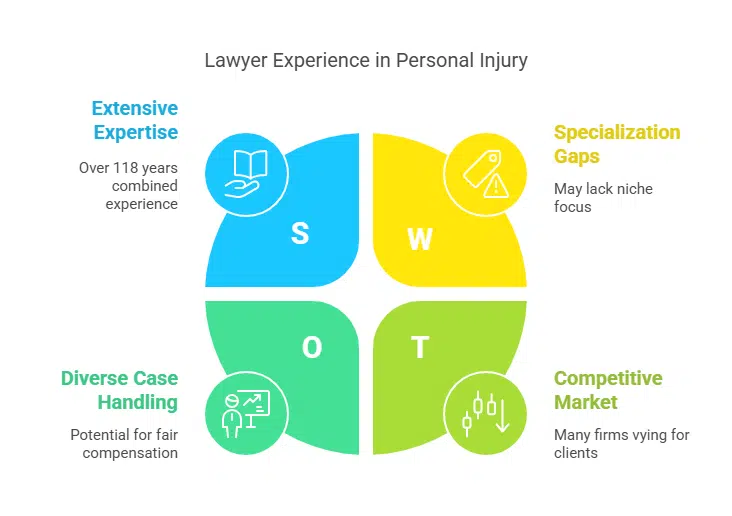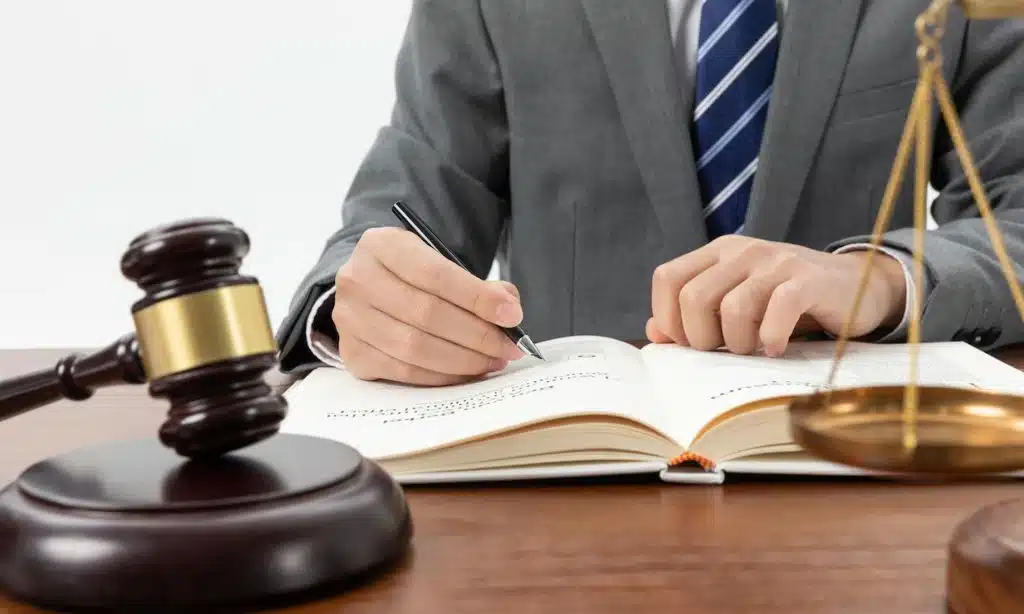Dealing with a personal injury can feel overwhelming. You’re likely juggling medical bills, lost wages, and the stress of recovery. Finding the right lawyer to handle your case is crucial to getting the compensation you deserve.
But how do you know if you’ve found the best fit?
In Australia, personal injury lawyers often work on a “no win, no fee” basis. This means they only get paid if your claim succeeds. Still, not all lawyers are created equal. Asking the right questions upfront can save you headaches later.
This guide will walk you through the top 10 questions to ask your personal injury lawyer in Australia. It’ll help you assess their expertise, understand fees, and set clear expectations for your case.
Ready to get started? Let’s find out what really matters when choosing legal representation!
The Importance of Selecting the Right Questions for Your Personal Injury Lawyer
Asking the right questions when hiring a personal injury lawyer can make or break your case. It helps you choose someone with the right expertise, track record, and approach to handle your situation effectively.
A good attorney-client relationship hinges on clear communication and trust, which starts with understanding their experience in negligence claims or workers compensation cases.
Questions about fees, like contingency arrangements, prevent unexpected costs. Knowing their success rate and willingness to litigate gives insight into their legal representation style.
Preparing for challenges ahead of time ensures smoother legal proceedings and better outcomes for your personal injury claim.
Assessing Expertise and Experience in Personal Injury Law
Ask your lawyer about their specialty in law to see if it matches your case. Find out how many personal injury cases they’ve handled and their success rate.
What is your specialty in law?
Start by confirming the lawyer’s specialty in law. Personal injury claims, like workplace injuries or motor vehicle accidents, require specific expertise. A lawyer specializing in personal injury law understands the details of negligence cases and compensation claims.
Kerry Splatt, an Accredited Specialist in Personal Injury Law from Splatt Lawyers, highlights this focus. Fewer than 4% of solicitors hold this distinction by the Queensland Law Society, making it rare but valuable.
A specialized lawyer handles medical reports, public liability insurance disputes, and workers’ compensation claims with accuracy. They ensure your case aligns with legal services customized to your needs without straying into unrelated fields like family or corporate law.
Ask how many personal injury cases they handle annually. This indicator gives you insight into their track record and familiarity with similar scenarios like burn victims or road accident survivors.
Legal representation should focus on areas like medical negligence or general damages for pain and suffering. Their experience directly affects your chances of securing fair compensation from insurers or opposing parties responsible for your injuries.
How long have you been practicing personal injury law?
You are inquiring about a lawyer’s experience in personal injury law matters. Firms like Taylor & Scott Lawyers bring over 118 years of expertise, while Maliganis Edwards Johnson (MEJ) boasts more than 35 years in the ACT.
A longer practice often means better handling of complex cases and understanding client needs. Experience can also reflect their ability to secure fair compensation for workplace injuries or negligence claims.
Always check if they specialize in areas like medical malpractice or workers’ compensation claims to ensure they match your case requirements.
Do you have experience with cases similar to mine?
Choosing a personal injury lawyer with experience in cases like yours can make a big difference. A lawyer familiar with workplace injury, medical negligence, or workers compensation claims knows the legal process inside out.
Kerry Splatt, an Accredited Specialist, highlights this expertise. They can navigate the specifics of your case, from medical reports to dealing with insurance companies. Ask for examples of past cases they’ve handled to gauge their practical experience.
Time limits for claims mean you need prompt, informed legal action. The right lawyer can assess risk, determine liability, and fight for the compensation you deserve.
Understanding the Legal Process and Timeline
Knowing the legal process and timeline helps you prepare for what’s ahead, so you won’t be left in the dark wondering, “What happens next?” Continue reading to get the full picture.
What is the expected duration for my case resolution?
Personal injury cases can take anywhere from a few months to several years. The time frame depends on how complex your case is and whether liability is disputed. For moderate to minor injuries, the average compensation time in Australia usually ranges between 6 and 10 months.
Claims involving workplace injuries or negligence can stretch up to two years if detailed medical reports are needed or settlement negotiations drag on. Motor vehicle accident claims often have strict deadlines, like the 12-month window for filing in some states.
Your lawyer’s ability to handle insurance companies and legal assistants efficiently can also impact the timeline.
Can you outline the legal steps for my case?
Your lawyer will start with a free case review to check if your claim is valid and estimate its value. Next, you’ll sign a legal agreement for no-risk funding, often called “no win, no fee.” Medical evaluations follow to gather evidence that supports your injury claims.
Your legal team will then assemble all necessary documents, like medical reports and accident details. Finally, they’ll negotiate settlements through mediation or prepare for trial if needed.
Clear communication keeps you informed at each step.
How frequently will you provide updates on my case status?
Asking about case updates helps manage expectations and keeps you informed. Initially, updates may be less frequent while evidence like medical reports is gathered. As negotiations or litigation progress, communication often increases due to ongoing developments.
Complex cases usually require more frequent check-ins to address new details. Make sure to discuss a clear update schedule with your personal injury lawyer so you can focus on recovery while they handle the legal process effectively and keep you in the loop when it matters most.
Clarifying Fees and Financial Obligations
Understanding costs upfront saves surprises later. Ask about contingency fees, upfront charges, and hidden expenses to plan better.
Do you offer a contingency fee arrangement?
Most personal injury lawyers in Australia work on a “no win, no fee” basis. This means you only pay legal fees if your claim succeeds. However, contingency fee arrangements—where lawyers take a percentage of the settlement—are banned in New South Wales and other parts of Australia.
Instead, lawyers may charge hourly rates or capped fees. In Queensland, for example, legal fees cannot exceed 50% of the net settlement amount. Always ask about upfront disbursement costs like medical reports or court fees, as these might still apply even under “No Win No Fee” agreements.
Clear communication about financial obligations is key to avoiding surprises later.
Are there any upfront charges I should anticipate?
Personal injury lawyers often work on a “no win, no fee” basis, so upfront charges are rare. Some expenses might still apply at the start of your case. Court filing fees or costs for obtaining medical reports could arise.
Ask about these potential costs during your free consultation to avoid surprises later. Even if you lose the case, certain out-of-pocket expenses may still need covering. Discuss all financial details with your lawyer before moving forward with your personal injury claim.
This ensures clarity and helps you plan accordingly without unexpected financial burdens.
You may also encounter extra fees like expert witness payments or administrative costs along the way. Confirm whether these will be handled by the law firm or billed separately to you.
Transparency from your compensation lawyer is key to understanding all possible charges tied to your legal representation. Knowing this ahead of time allows you to focus on your recovery while handling the legal process confidently.
What additional fees might I encounter?
You may face several additional fees during your personal injury claim. Upfront costs like medical reports, court fees, and expert witness charges are common. These disbursements are necessary out-of-pocket expenses tied to your case.
Under a no-win, no-fee agreement, uplift fees might apply, often up to 25% of base legal fees. Government refunds for Medicare or Centrelink repayments could also reduce your final compensation.
In Queensland, the 50:50 rule ensures lawyers don’t take more than half of the settlement after fees and disbursements. Always clarify potential costs with your lawyer upfront to avoid surprises later.
Exploring Potential Outcomes of Your Case
Ask your lawyer about their track record with cases like yours. Understanding the possible compensation range helps set realistic expectations for your claim.
What is your success rate with similar cases?
Knowing a personal injury lawyer’s success rate with cases like yours can give you confidence in their skills. A high success rate often shows they understand the legal system and can handle claims effectively.
Success rates can vary, depending on the details of each case and the lawyer’s approach. For example, a lawyer experienced in workplace injury claims might have a strong track record in that area.
This information helps set realistic expectations for your case. A lawyer’s past results may also shape how they handle your claim, ensuring they’re prepared to fight for your compensation.
What compensation range can be expected for my case?
Compensation payouts in personal injury cases vary widely. The type and severity of your injury play a big role. In 2022, the average payout for workplace injuries in Australia was $15,743.
Psychological injuries saw higher averages, with $58,615. Motor vehicle accident claims ranged from $59,576 for minor injuries to over $1.6 million for critical injuries. You might receive lump sums, medical expense coverage, lost wages, or payments for pain and suffering.
Permanent disability cases often lead to higher compensation. Your personal injury lawyer can help assess your case’s potential value and negotiate with the insurance company for the best outcome.
Are you prepared to take my case to trial if needed?
Finding out if your personal injury lawyer is ready to take your case to trial matters. A skilled lawyer should have a solid strategy for trial preparation, including using advanced resources like evidence warehouses and mock trials.
They must be willing to fight in court if the insurer doesn’t offer fair compensation, showing dedication to securing the best outcome for you. Ask about their previous trial experiences and success rates with similar cases.
This gives you confidence they can handle complex scenarios and advocate for your rights effectively during legal proceedings.
Ensuring Effective Communication
Effective communication starts with knowing who’s in your corner, how they’ll keep you in the loop, and whether you can pick up the phone when questions pop up—read on to see why this matters for your case.
Who will be my primary contact?
Knowing who will handle your case is essential. It keeps communication smooth and consistent. Your primary contact could be a lawyer, paralegal, or a dedicated case manager. Ask directly who that person will be.
Confirm their qualifications and experience in personal injury law. Make sure they’re available throughout your case. Discuss how often they’ll update you and the best way to reach them—email, phone, or in-person meetings.
Having one clear point of contact avoids confusion and ensures your questions get answered promptly. This makes the legal process less stressful.
What methods will you use to communicate with me?
Your personal injury lawyer should keep you in the loop through clear, consistent communication. Most lawyers use phone calls, emails, or in-person meetings to update clients on their case progress.
Regular updates are crucial to ease anxiety and build trust. Some firms even set up client portals for quick access to case details. Make sure to ask if direct communication with your lawyer is possible for urgent questions.
Understanding their preferred methods helps avoid delays and keeps you informed every step of the way during your personal injury claim.
Is direct communication with you possible for inquiries?
Direct communication with your personal injury lawyer is crucial. It helps you stay informed and confident about your case. Ask if they are available for direct calls or emails. Some lawyers assign a case manager, but it’s important to know if you can reach the attorney directly when needed.
Clear communication expectations should be set early on. Find out how frequently they will update you and who will handle your inquiries. This avoids confusion and ensures consistent updates throughout your compensation claim process.
A good lawyer prioritizes client interaction and remains accessible for urgent questions or concerns.
Takeaways
Choosing the right personal injury lawyer can make all the difference in your case. To offer deeper insights, we consulted John Archer, a seasoned personal injury lawyer with over 20 years of experience.
John holds a master’s degree in law from the University of Sydney and has successfully handled over 500 personal injury claims, ranging from workplace accidents to medical negligence cases.
John stresses the importance of asking the right questions. “Understanding your lawyer’s expertise, fee structure, and communication style is crucial. It builds trust and sets clear expectations.” He adds, “Clients often underestimate the value of a lawyer’s track record.








































